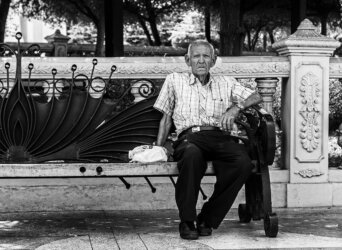- About
- Topics
- Picks
- Audio
- Story
- In-Depth
- Opinion
- News
- Donate
- Signup for our newsletterOur Editors' Best Picks.Send
Read, Debate: Engage.
| topic: | Election |
|---|---|
| located: | Venezuela |
| editor: | Ellen Nemitz |
The European Union External Action recommended, after a visit to Caracas, the capital city of Venezuela, that the legislative elections scheduled for December of this year should be postponed because, according to the report, "the conditions are not currently there for a free, fair and democratic electoral process to take place." Some opposition parties came to reinforce the request and, as the current president Nicolás Maduro refused to go ahead with a postponement, parties struggle to agree about better opposition strategy and a possible boycott.
The political instability in Venezuela is nothing new. The country used to have an economy based on oil export and a lack of investment in other activities such as industries and agriculture. Added to other financial and monetary problems, these policies led the country to collapse in the middle of 2010s, already under Maduro's administration (the entire situation is well explained by the BBC in an article in Portuguese). What came after was one of the biggest humanitarian crises in the modern world. According to the UN Refugee Agency, there were 3.6 million people from Venezuela displaced at the end of 2019, and those who stayed, are faced with violence and starvation. Almost two years ago, in January 2019, Juan Guaidó self-declared president, but, despite the recognition by dozens of countries, the position is not official.
Maduro has just entered into a new polemic by the pardon to politicians who were responding for crimes, both in jail or exiled. With this act, he is willing to have – or at least appears to – a fair election. Some of the benefited by the indulgence do not think that way. Under the hashtag #IndultooInsulto (in English, Indulgence or Insult), he was criticised on Twitter. "Neither Maduro is president, nor am I a criminal. If you want to contribute to the peace of Venezuela, pardon the country from the usurpation of power, renounce the factual occupation of the tragedy that has subjected our people and perhaps we will have something to thank you for," said the deputy Americo de Grazia.
Meanwhile, poverty is still hitting the population. People in Venezuela attended demonstrations on this Monday, October 5 (World Teacher’s Day), in order to support teachers and public education, organised in a context of resuming classes with no proper labour conditions and extremely low salaries. Other professional categories joined to ask for a living wage.
Like many other crises, this one has two sides. Beyond the left-wing parties' dispute, however, there must be above all a promotion of human rights. The European Union External Action finalised its report, affirming that "The political and humanitarian crisis in Venezuela will not be solved by a single event." The issue in need to be addressed is not only the coming up elections, but a long-term goal of building a country committed to human rights: "There is a need for negotiation between all stakeholders in Venezuela in order to find a democratic, peaceful and sustainable solution to the needs and demands of the Venezuelan people."
Image by David Mark

